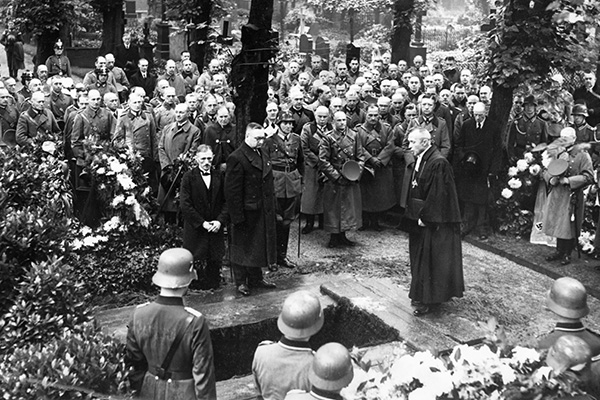
German Protestant Military Bishop Franz Dohrmann speaking at the graveside of Werner von Fritsch, the ex-Commander in Chief of the German Army, in Berlin, September 1939. BArch Bild 183-E11084/Photographer unknown
2024 J. B. and Maurice C. Shapiro Annual Lecture
During World War II, approximately 1,000 Christian chaplains served the German military. What role did these Catholic priests and Protestant pastors play in the Holocaust? Drawing on a wide array of sources—chaplains' letters, military reports, Jewish testimonies, photographs, and popular culture—this lecture offers insight into how some Christian clergy advanced the cause of genocide in Nazi Germany.
Join us in person in the Museum’s Helena Rubinstein Auditorium or view the live program virtually on YouTube. The in-person program will be followed by a dessert reception in the Hall of Witness.
Opening Remarks
Dr. Elizabeth Anthony, Director, Visiting Scholar Programs, United States Holocaust Memorial Museum
Speaker
Dr. Doris Bergen, J. B. and Maurice C. Shapiro Senior Scholar-in-Residence, United States Holocaust Memorial Museum; Chancellor Rose and Ray Wolfe Professor of Holocaust Studies in the Department of History and the Anne Tanenbaum Centre for Jewish Studies, University of Toronto
Moderator
Dr. Rebecca Carter-Chand, Director, Programs on Ethics, Religion, and the Holocaust, United States Holocaust Memorial Museum
This program is free and open to the public. Registration is required.
Register to receive a link to view the program.
For more information, please contact calendar@ushmm.org.
The J. B. and Maurice C. Shapiro Senior Scholar-in-Residence Fellowship, endowed by the J. B. and Maurice C. Shapiro Charitable Trust, enables the Mandel Center to bring a distinguished scholar to the Museum each year to conduct innovative research about the Holocaust and disseminate this work to the public. The scholar in residence also leads seminars, lectures at universities in the United States, and serves as a resource for the Museum, educators, students, and the general public.
The Jack, Joseph, and Morton Mandel Center’s mission is to ensure the long-term growth and vitality of Holocaust studies. To do that, it is essential to provide opportunities for new generations of scholars. The vitality and the integrity of Holocaust studies require openness, independence, and free inquiry so that new ideas are generated and tested through peer review and public debate. The opinions of scholars expressed before, during the course of, or after their activities with the Mandel Center do not represent and are not endorsed by the Museum or its Mandel Center.
